welcomeunit星期、月份节日3-4
Unit4 Schooldays-Welcome to the unit 课件

B: I usually … at …
A: Great. What time do you start
lessons/have sports/do morning exercises/…?
B: I ... at …
A: What do you think of your school
Morning exercises
Eye exercises Lunch Rest
Eye exercises Afternoon exercises After school activities
17:10-17:50 After school activities
A: …, when do you usually go to school
It's ten twenty-five. It's twenty-five past ten.
It's eleven fifteen. It's fifteen past eleven. a quarter= It's a quarter past eleven. 15 minutes
Presentation
Millie’s day
Millie’s day
Pair work - When does Millie get up? - She gets up at 7:00 a.m.
Further thinking Does Milie live far from school? Why or why not?
顺读:点钟+thirty 逆读:half past+点钟 It's one thirty. It's half past one. half=30 minutes
七年级下册U4welcome知识点
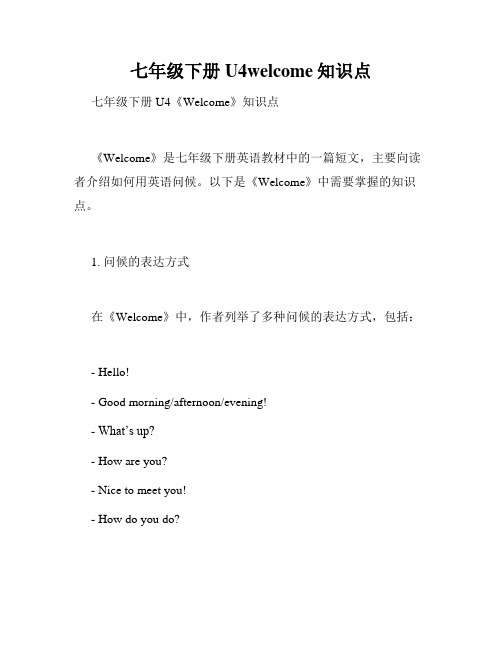
七年级下册U4welcome知识点七年级下册U4《Welcome》知识点《Welcome》是七年级下册英语教材中的一篇短文,主要向读者介绍如何用英语问候。
以下是《Welcome》中需要掌握的知识点。
1. 问候的表达方式在《Welcome》中,作者列举了多种问候的表达方式,包括:- Hello!- Good morning/afternoon/evening!- What’s up?- How are you?- Nice to meet you!- How do you do?这些表达方式在不同的场合和对不同的人使用时,会产生不同的语境和语义。
学生们需要明确它们的用途,并掌握它们的语音、语调和重音,才能流利准确地问候别人。
2. 回应问候的表达方式除了问候,回应问候也是英语交流中的重要方面。
在《Welcome》中,作者介绍了以下回应问候的表达方式:- Hi!- Good morning/afternoon/evening!- Not bad, thanks.- Nice to meet you, too.- How do you do?学生们需要理解这些表达方式所包含的意思,并能够准确应答,以维持交流的流畅性和礼貌性。
3. 语音和语调英语的语音和语调对于准确表达问候内容和传递信息都很重要。
在《Welcome》中,学生们需要重点掌握以下语音和语调:- 语音:母音和辅音的发音方式。
- 语调:语音的上升和下降,以及重音的分配。
这些方面的掌握需要通过反复朗读、模仿和练习才能逐步进步。
4. 文化背景英语问候中还包含了很多文化背景和风俗习惯。
在《Welcome》中,作者也提到了一些例子,比如在美国,约见别人时通常需要约在具体时间、地点和日期,不能说“明天见”,这让学生们体会到英语交流中文化因素的影响。
学生们需要在学习语言知识的同时,加深对英语使用国家的文化了解,提高自己的跨文化交际能力。
总之,在学习《Welcome》这篇短文时,学生们需要掌握以上四个方面的知识点,才有可能达到较好的学习效果和交流表达能力。
牛津译林版七年级上册(2024)Unit 4 School day 语言点和语法点整理
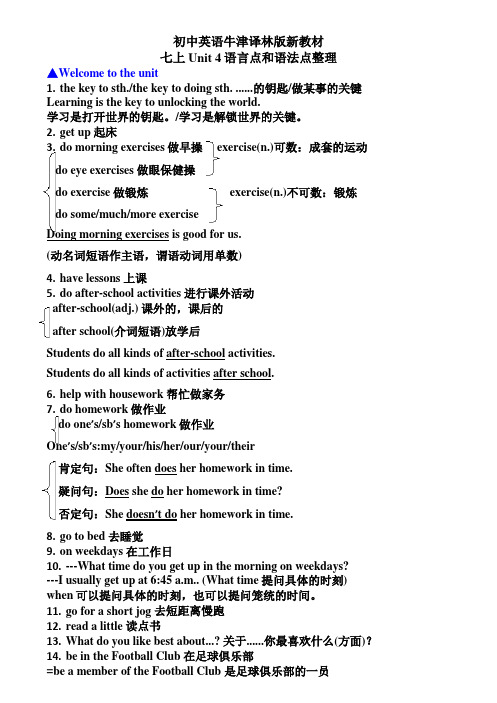
初中英语牛津译林版新教材七上Unit 4语言点和语法点整理▲Welcome to the unit1.the key to sth./the key to doing sth. ......的钥匙/做某事的关键Learning is the key to unlocking the world.学习是打开世界的钥匙。
/学习是解锁世界的关键。
2.get up 起床3.do morning exercises做早操 exercise(n.)可数:成套的运动 do eye exercises 做眼保健操do exercise 做锻炼 exercise(n.)不可数:锻炼do some/much/more exerciseDoing morning exercises is good for us.(动名词短语作主语,谓语动词用单数)4.have lessons 上课5.do after-school activities 进行课外活动after-school(adj.) 课外的,课后的after school(介词短语)放学后Students do all kinds of after-school activities.Students do all kinds of activities after school.6.help with housework 帮忙做家务7.do homework做作业do one’s/sb’s homework做作业One’s/sb’s:my/your/his/her/our/your/their肯定句:She often does her homework in time.疑问句:Does she do her homework in time?否定句:She doesn’t do her homework in time.8.go to bed 去睡觉9.on weekdays 在工作日10.---What time do you get up in the morning on weekdays?---I usually get up at 6:45 a.m.. (What time提问具体的时刻) when可以提问具体的时刻,也可以提问笼统的时间。
Unit4 My day welcome to the unit教案牛津译林版七年级上册
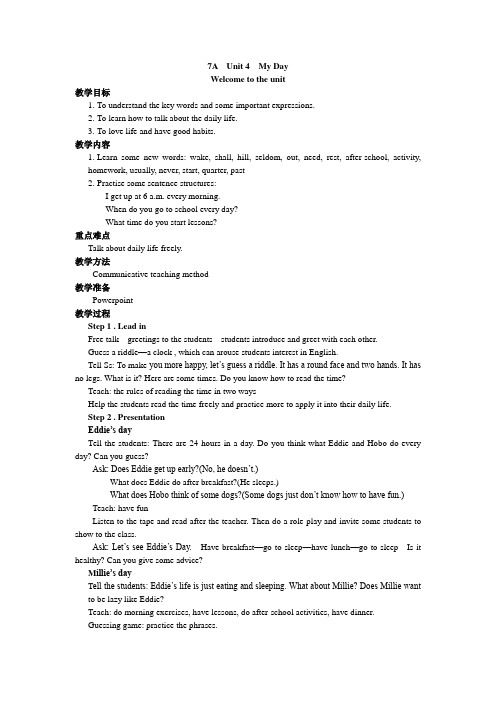
7A Unit 4 My DayWelcome to the unit教学目标1.To understand the key words and some important expressions.2.To learn how to talk about the daily life.3.To love life and have good habits.教学内容1.Learn some new words: wake, shall, hill, seldom, out, need, rest, after-school, activity,homework, usually, never, start, quarter, past2.Practise some sentence structures:I get up at 6 a.m. every morning.When do you go to school every day?What time do you start lessons?重点难点Talk about daily life freely.教学方法Communicative teaching method教学准备Powerpoint教学过程Step 1 . Lead inFree talk---greetings to the students---students introduce and greet with each other.Guess a riddle—a clock , which can arouse students interest in English.Tell Ss: To make you more happy, let’s guess a riddle. It has a round face and two hands. It has no legs. What is it? Here are some times. Do you know how to read the time?Teach: the rules of reading the time in two waysHelp the students read the time freely and practice more to apply it into their daily life.Step 2 . PresentationEddie’s dayTell the students: There are 24 hours in a day. Do you think what Eddie and Hobo do every day? Can you guess?Ask: Does Eddie get up early?(No, he doesn’t.)What does Eddie do after breakfast?(He sleeps.)What does Hobo think of some dogs?(Some dogs just don’t know how to have fun.) Teach: have funListen to the tape and read after the teacher. Then do a role-play and invite some students to show to the class.Ask: Let’s see Eddie’s Day. Have breakfast—go to sleep—have lunch—go to sleep Is it healthy? Can you give some advice?M illie’s dayT ell the students: Eddie’s life is just eating and sleeping. What about Millie? Does Millie want to be lazy like Eddie?Teach: do morning exercises, have lessons, do after-school activities, have dinner.Guessing game: practice the phrases.Pair work:When does Millie usually get up? She usually gets up at 6:30.Step 3. PracticeMy dayAsk: We know a lot about M illie’s day. What about our day? What do you do at school every day? Speak out and make sentences like I get up at 6:00 a.m.Help students put these new phrases into practice.Listen and answer: When does Millie go to school every day?Is Millie often late for school? (She is never late for school.) Listen again and try to repeat it. Read after the teacher. After that, make up a new dialogue with the model Part B.Step 4. ProductionDiscussion: What should we do at school every day? ( We should study hard. We should play well. We should enjoy our school life every day.) Make an oath together: I plan to cherish time, and I will try my best to study hard ! I plan to make progress every day, and I will succeed one day.Step5. Summary and homeworkAsk: What did you learn in this class?1、Write some sentences about your day.2、Recite the comic and Part B.板书设计教学反思。
Starter Unit 3 Welcome!(单元复习课件)【课堂无忧】人教2024版七上英语

二、词组归纳
9. 黑色的兔子 10. 白色的绵羊 11. 一座红房子 12. 大树 13. 各种各样的
black rabbits white sheep a red house big trees many kinds of
重点句型过关
三、句型积累
1. 这是什么? 2. 这是一只猫。 3. 那是什么? 4. 那是一条狗。 5. 这些是什么? 6. 他们是胡萝卜苗。 7. 那些是什么? 8. 那些是苹果树。
五、单元语法
What's this / that?
句型结构:“What are these/those?”是一个特殊疑问句,用于询问这些 /那些是什么。 答语为:They are+事物名称.They are可以缩写为They're
eg: What are those?那些是什么? They're dragon boats.它们是龙舟。
五、单元语法
How many ... can you see?
How many 含义:用来提问多少,询问事物的数量,修饰可数名词的复数。 用法:1.接可数名词复数;2.接不可数名词加计量词 结构:How many+复数名词+ 一般疑问句? 口决:how many在句首,名词复数跟着走,一般问句紧相随,其它成分不要丢
四、重点知识
kind adj. 宽容的,善良的
be kind to sb. = be friendly to sb. 对某人友好
eg: 你喜欢什么种类的花?
Wh__a_t_____ k__in__d____ __o_f__ flowers do you like?
在中国,我的朋友们对我很友好?
My friendasr_e_______ _k_i_n_d____ ___to__ in the China?
七年级英语上册Unit4MydayWelcometotheunit课件(新版)牛津版

Millie, when do you go to school every day? I usually go to school at 7:20. I’m never late for it. Good. What time do you start lessons? At a quarter past eight. When do you do morning exercises? We do morning exercises at 8 o’clock. Oh, you do morning exercises before you start lessons. When do you have lunch? I have lunch at 11:50. What time do you go home? At half past four. Do you enjoy school, Millie? Yes. I enjoy it very much.
Millie’s day
6:30 a.m. Get up
7:00 a.m. Have breakfast
_7_:2_0__a_.m__._ Go to school
8:00 a.m. Do morning exercises
_8_:1_5__a_.m__._ Have lessons
…
…
Millie, when do you go to school every day? I usually go to school at 7:20. I’m never late for it. Good. What time do you start lessons? At a quarter past eight. Do you enjoy school, Millie? Yes. I enjoy it very much.
牛津英语译林版7A Unit4 Welcome to the Unit(共32张PPT)
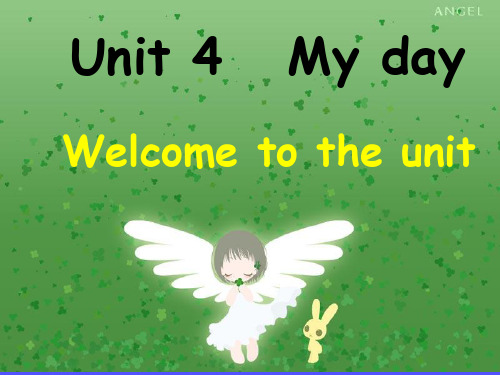
需要好好休息
need a good rest
玩得高兴
have fun/ a good time
学校生活
school life
在校的一天
a day at school
起床
get up
吃早/中/晚饭have breakfast/ lunch/ dinner
上课
have/ start lessons
做课外活动 do after-school activities
a quarter past eight
be late for
have breakfast/ lunch/ dinner
Millie’s Day
Millieg_e_t_s_ up at 6:30 a.m. She e__a_t_s_ breakfast at 7:00 a.m. Then she _g__o_e_sto school. At 8:00 a.m. she d__o_e_s_ morning exercises. After that, she _h_a_s__ lessons at 8:25 a.m. She _e_a_t_s_ lunch at 11:50a.m. At 1:30 p.m. she _h_a_s_ lessons again. At 4:00 p.m. shed_o_e__s_ after-school activities. She _g_o_e__s home at 4:30 p.m. She _d_o_e_s_ her homework at 5:30 p.m.
Homework:
1. Words and phrases. 2. Ss’ book and workbook.
• 9、春去春又回,新桃换旧符。在那桃花盛开的地方,在这醉人芬芳的季节,愿你生活像春天一样阳光,心情像桃花一样美丽,日子像桃子一样甜蜜。 2021/3/92021/3/9Tuesday, March 09, 2021
牛津七年级英语上册课件:Unit 5 Welcome课件

Comic Comic
and and
Strip Strip
Hobo Hobo
Listening:
Answer:What festival do they celebrate?
Reading:
Are Hobo and Eddie happy ? What is Hobo dressing up as ? What will he tival
On that day , families often get together We eat a kind of special food like moon
We enjoy the full moon in the open air(户外).
Eddie Eddie
Christmas
圣诞节
Halloween 万圣节前夜
October the 31st
ghost
n.鬼
dress up as… 装扮成…
dress v. 给…穿衣服
Monkey King
美猴王
Thanksgiving Day
感恩节
turkey n. 火鸡
Do you know other festivals in China?
Dragon Boat Festival
It is an important festival in China
On that day,Chinese people often eat rice dumplings. Watch Dragon Boat races (龙舟赛)
Thanksgiving day
A: Which is your favourite
festival?
Unit3Unit4知识点汇总与练习(讲义)闽教版英语五年级上册
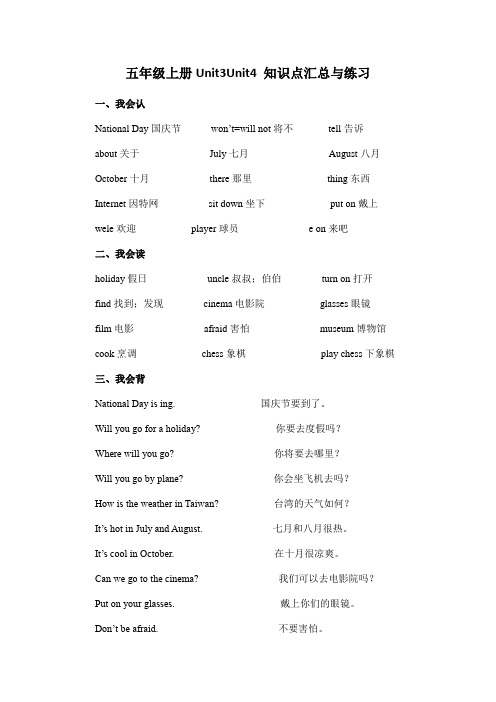
五年级上册Unit3Unit4 知识点汇总与练习一、我会认National Day国庆节won’t=will not将不tell告诉about关于July七月August八月October十月there那里thing东西Internet因特网sit down坐下put on戴上wele欢迎player球员 e on来吧二、我会读holiday假日uncle叔叔;伯伯turn on打开find找到;发现cinema电影院glasses眼镜film电影afraid害怕museum博物馆cook烹调chess象棋play chess下象棋三、我会背National Day is ing. 国庆节要到了。
Will you go for a holiday? 你要去度假吗?Where will you go? 你将要去哪里?Will you go by plane? 你会坐飞机去吗?How is the weather in Taiwan? 台湾的天气如何?It’s hot in July and August. 七月和八月很热。
It’s cool in October. 在十月很凉爽。
Can we go to the cinema? 我们可以去电影院吗?Put on your glasses. 戴上你们的眼镜。
Don’t be afraid. 不要害怕。
Wele to the Science Museum. 欢迎来到科学博物馆。
I can cook. 我会烹饪。
Can you play chess? 你会下象棋吗?Yes, I can./No, I can’t. 是的,我会。
/不,我不会。
四、我会答1. Will you go to Wuyishan by train?2. How is the weather in summer?3. How is the weather in autumn?4. Can you play football?五、我会写写出相应的英文单词假日叔叔;伯伯找到;发现打开电影院眼镜电影害怕博物馆烹调象棋下象棋写出相应的汉语意思National Day tell aboutJuly August Octoberthere wele sit downput on e on player翻译下面句子你要去度假吗?你会坐飞机去吗?台湾的天气如何?在七月和八月很热,但是在十月很凉爽。
Starter Unit 3 Welcome!(课件)-2024-2025学年人教版英语七年级上册

Post-listening
Conversation 3 Helen: What kind of tree is this? Mr Fu: It’s an apple tree. Helen: How many apple trees do you have? Mr Fu: Only two. Helen: Look at those rabbits. They’re cute! How many
rabbits do you have? Mr Fu: I have 12 rabbits. Eight are white and four are black.
Post-listening
Listen to the conversations again and read with your partner. Conversation 1 Fu Xing: Hello, Peter and Helen! This is my grandpa. Peter & Helen: Hello, Mr Fu. Nice to meet you! Mr Fu: Nice to meet you too. Welcome to my house. Let
Language point
3) 三位数读法: 英语中有“百”的计数单位,直接用 数字+计数单位+数字即可。 比如:105读作one hundred and five 225读作two hundred and twenty-five hundred不加s 【拓展】 四位数可用“千”的计数单位,读法同上。 2,225读作two thousand two hundred and twenty-five
—It’s a ruler. 这是一把尺子。 ➢ —What’s that? 那是什么?
新人教版小学英语五年级下册第三单元月份与节日汇总知识点
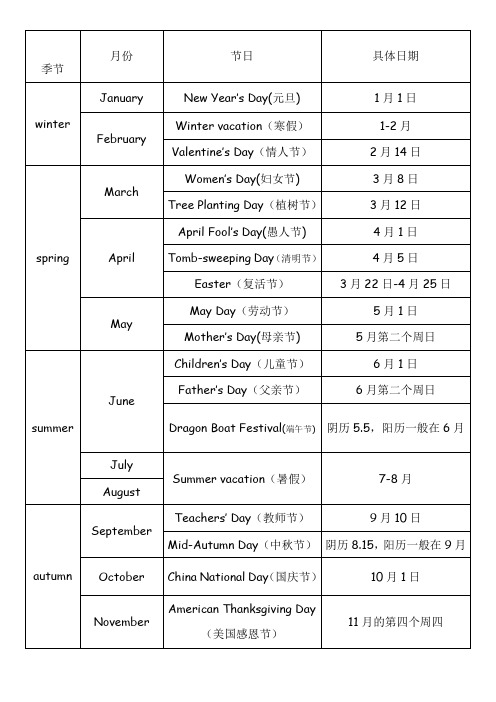
季节月份节日具体日期winterjanuarynewyearsday元旦1月1日februarywintervacation寒假12月valentinesday情人节2月14日springmarchwomensday妇女节3月8日treeplantingday植树节3月12日aprilaprilfoolsday愚人节4月1日tombsweepingday清明节4月5日easter复活节3月22日4月25日maymayday劳动节5月1日mothersday母亲节5月第二个周日summerjunechildrensday儿童节6月1日fathersday父亲节6月第二个周日dragonboatfestival端午节阴历55阳历一般在6月julysummervacation暑假78月augustautumnseptemberteachersday教师节9月10日midautumnday中秋节阴历815阳历一般在9月octoberchinanationalday国庆节10月1日novemberamericanthanksgivingday美国感恩节11月的第四个周四winterdecemberchristmas圣诞节12月25日
9月10日
Mid-Autumn Day(中秋节)
阴历8.15,阳历一般在9月
October
China National Day(国庆节)
10月1日
November
American Thanksgiving Day(美国感恩节)
11月的第四个周四
winter
December
Christmas(圣诞节)
3月8日
Tree Planting Day(植树节)
3月12日
April
April Fool’s Day(愚人节)
牛津 7a unit 4 my day welcome to the unit

教学活动的教学方法和策略
互动式教学:通过提问、讨论等方式让学生积极参与课堂活动 情境式教学:创设真实或模拟的情境让学生在情境中学习和运用语言 任务型教学:设计一系列任务让学生在完成任务的过程中学习和运用语言
合作式教学:让学生在小组中合作完成任务提高学生的合作能力和语言运用能力
THNK YOU
PWRelcTom4e the Unit的PPT内
容
PPT的主题和目的
单击添加标题
主题ห้องสมุดไป่ตู้牛津7 Unit 4 My Dy Welcome the Unit
单击添加标题
目的:介绍牛津7 Unit 4 My Dy Welcome the Unit的内容帮助学 生理解并掌握相关知识点。
PPT的主要内容
汇报人:
汇报时间:20XX/01/01
YOUR LOGO
牛津7 Unit 4 My Dy Welcome the Unit
,
汇报人:
时间:20XX-XX-XX
目录
01
添加标题
02
03
04
05
牛津7 Unit 4 的简介
Welcome the Unit部分
Welcome the Unit的 PPT内容
Welcome the Unit的 教学活动设计
单元介绍:介绍本单元的主题、内容和目标 学习目标:列出本单元的学习目标如词汇、语法、听说读写等 学习建议:提供学习建议如如何提高学习效率、如何复习等 学习资源:推荐相关的学习资源如教材、在线课程、练习题等 单元总结:对本单元进行总结强调重点和难点 单元测试:提供单元测试题帮助学生检验学习成果
单元教学内容
主题:My Dy
七年级英语上册 Unit 3 Let’s celebrate Welcome to the unit

Mid –Autumn Festival
enjoy the moon eat mooncake s
Dragon Boat Festival
have boat races
eat rice dumplings
Christmas
Christmas tree
Father Christmas get Christmas presents sing Christmas songs
The Dragon Boat Festival
The Mid-Autumn Festival
rice dumplings mooncakes
have boat races
enjoy the moon get toபைடு நூலகம்ether
Christmas Thanksgiving Day Halloween
puddings
H
17
H
18
Group work
• Discuss in groups about your favourite festivals. You can use these words below:
Hello! My name is …… My favourite festival is…… Because…… On that day, I can……
• People often dress up as a ghost at_H__a_ll_o_w_e_e_n_.
H
15
dress up as
a ghost
dress up as
Monkey King
Listen to the tape carefully and answer the questions.
Starter+Unit+3+Welcome+知识点++2024-2025学年人教版八年级英语上册

Starter Unit 3 Welcome!◆重点短语1.in a yard 在院子里2.carrot plant 胡萝卜植株3.baby chicken 小鸡4.apple tree 苹果树5.go to the lake 去湖边6.listen to music 听音乐7.in the sun 在阳光下8.tell jokes 讲笑话9.have fun 玩得开心10.how many 多少e with sb. 和某人一起12.on a/the farm 在农场里13.black and white cows 黑白花奶牛14.a small lake 一个小湖15.many kinds of 许多种类的16.behind the big tree 在大树后面17.look at 看;瞧18.another duck 另一只鸭子19.what else 其他的什么20.at weekends=at the weekend=on weekends=on the weekend在周末21.play with 和...一起玩22.show you around 带你参观一下23.go out 外出◆重点句子1.—What's that?—It's a cat. —那是什么?—是一只猫。
2.—What are these? —They're carrot plants. —这些是什么?—是胡萝卜植株。
3.What animals does Helen see in the yard? 海伦在院子里看到了什么动物?4.How many rabbits does Fu Xing's grandpa have? 付兴的爷爷有多少只兔子?5.You can see many kinds of animals. 你可以看到许多种类的动物。
6.What else can you see on the farm? 你在农场里还能看到什么呢?7.What is fun in a yard? 院子里有什么好玩的?8.Let me count. 让我数一下。
月、星期、节日英语单词【范本模板】

阳历节日:1月1日元旦(new year's day)2月2日世界湿地日(world wetlands day)2月14日情人节(valentine’s day)3月3日全国爱耳日3月5日青年志愿者服务日3月8日国际妇女节(international women’ day)3月9日保护母亲河日3月12日中国植树节(china arbor day)3月14日白色情人节(white day)3月14日国际警察日(international policemen’ day)3月15日世界消费者权益日(world consumer right day)3月21日世界森林日(world forest day)3月21日世界睡眠日(world sleep day)3月22日世界水日(world water day)3月23日世界气象日(world meteorological day)3月24日世界防治结核病日(world tuberculosis day)4月1日愚人节(april fools’ day)4月5日清明节(tomb—sweeping day)4月7日世界卫生日(world health day)4月22日世界地球日(world earth day)4月26日世界知识产权日(world intellectual property day)5月1日国际劳动节(international labour day)5月3日世界哮喘日(world asthma day)5月4日中国青年节(chinese youth day)5月8日世界红十字日(world red—cross day)5月12日国际护士节(international nurse day)5月15日国际家庭日(international family day)5月17日世界电信日(world telecommunications day)5月20日全国学生营养日5月23日国际牛奶日(international milk day)5月31日世界无烟日(world no—smoking day)6月1日国际儿童节(international children's day)6月5日世界环境日(international environment day)6月6日全国爱眼日6月17日世界防治荒漠化和干旱日(world day to combat desertification)6月23日国际奥林匹克日(international olympic day)6月25日全国土地日6月26日国际禁毒日(international day against drug abuse and illicit trafficking) 7月1日中国共产党诞生日(anniversary of the founding of the chinese communist party)7月1日国际建筑日(international architecture day)7月7日中国人民抗日战争纪念日7月11日世界人口日(world population day)8月1日中国人民解放军建军节(army day)8月12日国际青年节(international youth day)9月8日国际扫盲日(international anti-illiteracy day)9月10日中国教师节(teacher’s day)9月16日国际臭氧层保护日(international day for the preservation of the ozone layer)9月20日全国爱牙日9月21日世界停火日(world cease—fire day)9月27日世界旅游日(world tourism day)10月1日中华人民共和国国庆节(national day)10月1日国际音乐日(international music day)10月1日国际老年人日(international day of older persons)10月4日世界动物日(world animal day)10月5日世界教师日(world teachers' day)(联合国教科文组织确立)10月8日全国高血压日10月9日世界邮政日(world post day)10月10日世界精神卫生日(world mental health day)10月14日世界标准日(world standards day)10月15日国际盲人节(international day of the blind)10月15日世界农村妇女日(world rural women’s day)10月16日世界粮食日(world food day)10月17日国际消除贫困日(international day for the eradication of poverty) 10月24日联合国日(united nations day)10月24日世界发展新闻日(world development information day)10月28日中国男性健康日10月29日国际生物多样性日(international biodiversity day)10月31日万圣节(halloween)11月8日中国记者节11月9日消防宣传日11月14日世界糖尿病日(world diabetes day)11月17日国际大学生节11月25日国际消除对妇女的暴力日(international day for the elimination of violence against women)12月1日世界爱滋病日(world aids day)12月3日世界残疾人日(world disabled day)12月4日全国法制宣传日12月9日世界足球日(world football day)12月25日圣诞节(christmas day)12月29日国际生物多样性日(international biological diversity day)1月最后一个星期日国际麻风节3月最后一个完整周的星期一中小学生安全教育日春分月圆后的第一个星期日复活节(easter monday)(有可能是3月22-4月25日间的任一天)5月第二个星期日母亲节(mother’s day)5月第三个星期日全国助残日6月第三个星期日父亲节(father's day)9月第三个星期二国际和平日(international peace day)9月第三个星期六全国国防教育日9月第四个星期日国际聋人节(international day of the deaf)10月的第一个星期一世界住房日(world habitat day)10月的第二个星斯一加拿大感恩节(thanksgiving day)10月第二个星期三国际减轻自然灾害日(international day for natural disaster reduction)10月第二个星期四世界爱眼日(world sight day)11月最后一个星期四美国感恩节(thanksgiving day)农历节日农历正月初一春节(the spring festival)农历正月十五元宵节(lantern festival)农历五月初五端午节(the dragon-boat festival)农历七月初七乞巧节(中国情人节) (double—seventh day)农历八月十五中秋节(the mid—autumn festival)农历九月初九重阳节(the double ninth festival)农历腊月初八腊八节(the laba rice porridge festival)一至十二月:January ,February, March,April, May ,June,July,August,September,October,November,December春到冬:spring, summer, autumn,winter星期一到日:Monday,Tuesday,Wednesday,Thursday,Friday,Saturday,Sunday时间:minu,:分,复数直接加“s".hour:时,复数与上同.day:天,上同。
Starter Unit 3 Welcome! 单元词汇图文讲解课件-七年级英语上册(人教版)

短语:
另一个
n.谈话;交谈
carrot and stick 胡萝卜加大棒, 软硬兼施
Bring some carrots in from the garden, so we can cook dinner.
从菜园拔一些胡萝卜来,这样我们就可以做
carrot juice 胡萝卜汁;红萝卜汁 carrot seed 胡萝卜籽;胡萝卜精油 carrot oil 胡萝卜油;胡萝卜籽油
pair n.一对
this pron.这个
glasses n.眼镜
Your dogs are really cute.
你的狗狗们真可爱。
dog n.狗
dog /dɒɡ/
n. 狗,犬,犬科动物 v. 跟踪;尾随;
(灾难等)缠住
短语: hot dog 热狗(面包夹熏红肠) police dog 警犬 black dog 沮丧 lazy dog 懒汉,懒家伙 pet dog 宠物狗
cat n.猫
chicken n.鸡;鸡肉
rabbit n.兔子
goose n.鹅
These chickens look so different.
这些鸡长得很不一样。
chicken /'tʃɪkɪn/
n. 鸡;鸡肉 adj. 胆小的 vi. 畏缩不前
短语: chicken bone 鸡骨头 chicken soup 鸡汤 fried chicken 炸鸡 roast chicken 烤鸡 chicken farm 养鸡场
20XX-XX-XX
提示:根据例句选择相应的 图片(点击图片出答案)。
thing n.东西;事情
fun n.乐趣;好玩
yard n.院子
- 1、下载文档前请自行甄别文档内容的完整性,平台不提供额外的编辑、内容补充、找答案等附加服务。
- 2、"仅部分预览"的文档,不可在线预览部分如存在完整性等问题,可反馈申请退款(可完整预览的文档不适用该条件!)。
- 3、如文档侵犯您的权益,请联系客服反馈,我们会尽快为您处理(人工客服工作时间:9:00-18:30)。
英语《基础模块》第一册预备单元
Welcome unit
第3-4课时 (第十周)
一.教学内容:星期、月份和节日
二.教学目标:
1.能力目标:①能够在日常生活中用星期、月份和节日进
行表达和交流
2.知识目标:①掌握星期、日期和节日的英文表达方式3.情感目标:①增强学生学习语言的自信心,激发其学习
英语的乐趣及学习英语的必要性。
②通过节假日这部分内容的学习,使学生多
了解一些东西方文化,增强学生学习英语的
兴趣
三.教学重点:
掌握星期、日期和节日的英文表达方式
四.教学难点:
能够在日常生活中利用以上信息进行表达和交流。
五.教学方法:交际教学法、游戏教学法、讲授法六:学习方法:小组合作学习
七:教学媒体:PPT课件
八:教学过程:
Step一:导入
1.老师提问,学生回答
What day is it today?
What’s the date today?
Do you know Christmas?
(设计意图:通过提问的方式,运用头脑风暴教学法,回忆并复习了有关星期、月份和节日的词汇和问句,并为接下来的复习作铺垫。
)
Step二:讲解
1.请同学在黑板上默写有关星期、月份和节日的单词。
(设计意图:通过这种方式,了解学生对星期、月份和节日掌握的情况,并让学生回忆和思考,进入学习状态。
)
2.教读单词并讲解如何记住单词,尤其是学生出错的单词。
Monday Tuesday Wednesday Thursday Friday Saturday Sunday
January February March April
May June July August
September October November December Christmas Mid-Autumn Festival Spring Festival Teacher’s Day Thanksgiving Day National Day
老师从音标发音的角度,从共同点的角度,从谐音的角度等各方面加深学生对这些单词的印象和更好的记忆读记
单词。
(设计意图:老师通过使用各种各样的方法,提高学生的学习兴趣,让原本枯燥无味的单词变的形象生动,课堂气氛活跃,同时也帮助学生更好的读记单词。
)
3.游戏
老师说英语学生说汉语,或者老师说汉语学生说英语,速度由慢变快,再把英汉交换,让学生能快速的说出单词。
老师可以先全班进行,再请同学做。
(设计意图:活跃课堂气氛,让学生加深对单词的印象,同时也考验了学生的反应能力和他们的注意力。
)
4.老师要求学生在本子上默写。
(设计意图:通过默写,让学生冷静思考,回忆,也能从开始兴奋的游戏中回到学习上来,让学生更好的掌握单词。
)Step三:听说
1.播放第一和二部分录音,指导学生复习与星期、月份和节日相关的对话,句型。
要求学生听并跟读。
2.活动:两人一组,仿照课文范例进行问答。
教师巡查,了解学生完成情况,并适当指导。
(设计意图:增加语言的输入和输出。
进一步熟练单词和基本句型,并培养学生的合作及交流意识。
)
Step四:总结
小组合作的方式让学生对本次课的重点进行总结,归纳。
老
师进行适当的引导。
Step五:作业
1.抄写星期、月份和节日。
2.完成练习册上相关习题。
3.预习下次课的内容。
Step六:教学反思
Step七:板书设计。
